Election 2015: Does 'vote swapping' work?
- Published
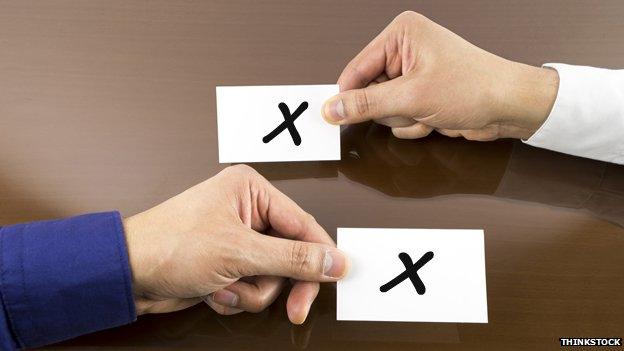
Vote-swapping websites seem to be gaining traction on social media. But what makes people swap votes, and will it really make a difference to the election result?
Jodie Holland and Dr Tim Killeen don't know each other.
But they've made a pact. On 7 May, they will walk into polling stations in different constituencies and vote for the party the other wants to win.
In doing so, both believe it will boost the chances of the party they want in power.
"There's no point voting Labour here, I think it's a safe Lib Dem seat," says 34-year-old market researcher Jodie Holland, from Twickenham. "But getting someone else to vote Labour in a closer constituency could make a real difference. It makes me feel better about voting tactically," she says.
Dr Tim Killeen, an 33-year-old expat who lives in Switzerland but is registered to vote in Tamworth, Staffordshire, agrees. He wants to vote Lib Dem, but feels his vote is "utterly wasted" there.
Business Secretary Vince Cable has held Twickenham for five consecutive elections, but the Conservatives have been targeting the seat and polls suggest Mr Cable has a fight on his hands. By swapping his vote to that constituency, Dr Killeen thinks it might have an impact.
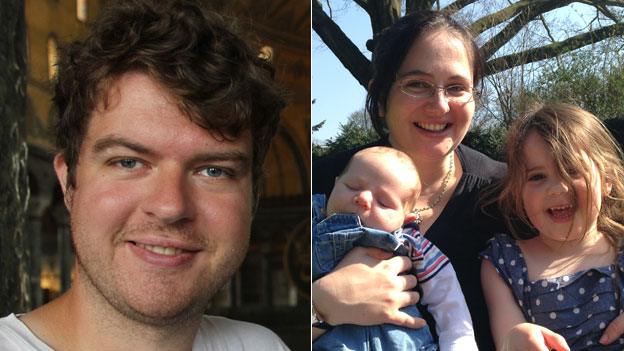
Dr Tim Killeen and Jodie Hamilton have agreed to swap votes on the 7 May
"I genuinely get a feeling of democratic empowerment by swapping my vote. It gives a chance to influence the government of the country to the potentially millions of citizens who find themselves through geographic bad luck supporting a party in a hopeless situation locally," he says.
The two voters seem to be part of a growing trend. VoteSwap,, external which "helps Labour and Green supporters swap votes to keep out the Tories" in constituencies in England, says it has had more than 10,000 pledges to swap votes.
Swap My Vote, external, which has no political agenda and pairs voters "in order to minimise wasted votes", says it has had more than 1,000 people sign up to the site since it launched last week.
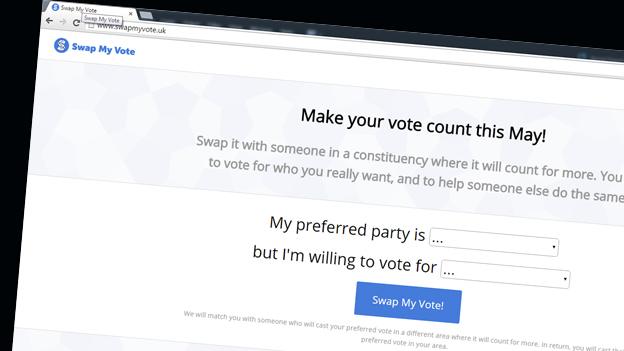
Co-founder Tom de Grunwald believes people are attracted to the sites because they want to make their vote count.
"There's a problem with the first-past-the-post electoral system. We want to the create a new paradigm of democracy which will increase engagement and enfranchisement," he says.
VoteSwap clearly has a more political agenda. Co-creator Huw Jordan, 28, says the site resonates with voters because it conveys the common ground between progressive parties, and gives people the opportunity to act.
By contrast, writer and Conservative campaigner Toby Young, external launched a site called Unite The Right, external with the aim of helping Tory and UKIP supporters co-ordinate their votes in order to deliver a referendum on European Union membership and prevent a government led by Ed Miliband.
As long as there is no inducement or coercion, these sites don't fall foul of the law, according to the Electoral Commission.
Tactical voting has always been around, according to Dr Stephen Fisher, an expert in political sociology at Oxford University. He estimates up to 9% of voters mark their ballot papers tactically, influencing the results of about 45 seats in the process.
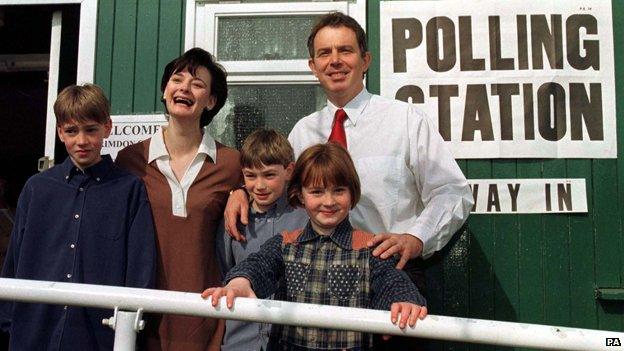
Tactical voting began to happen on a significant scale in 1997
The first online "swapping" sites started back in 2005, but it's not clear how many voters stuck to their commitment, or what impact the sites had.
People aren't allowed to use cameras in polling booths, so it's impossible to prove whether people have kept their pledges.
Essentially, it comes down to trust, says Mr de Grunwald.
"Swap my Vote introduces people who might want to swap votes, but what they actually do is up to them. They can have a conversation on social media, or off site if they want. But when it comes to voting, it's down to the individuals. It's a secret ballot - there is no way of proving it," he says.
Mother-of-two Ms Holland thinks most people who sign up to vote-swapping websites fully intend to follow through on their pledge. "You've got to believe most people are honest," she says. Dr Killeen is similarly philosophical: "If your swap partner reneges on the deal you don't really lose out as your vote wouldn't have counted anyway."


Faye Savage, 26, from Colchester, is swapping her vote
"I live in an area that will be either Conservative or Lib Dem. I'm torn between Labour and the Greens, but know neither stands a chance here. The site asks you who you want to vote for, which area you are in, and who you are prepared to vote for. It matches you with someone in the opposite situation and gives you a name and area so you can look them up on social media. I wouldn't want to swap my vote if it brought up someone who said they would vote Labour or UKIP, as it's clear they might go off in an extremely different direction. But my assumption is people stay to their side of the spectrum, and I don't have a clear preference between Labour and the Greens."

But does vote swapping actually make any difference?
Polling expert Professor John Curtice says tactical voting first began to have an impact in 1974. "Research showed the Labour Party got a four-seat majority - some research shows tactical voting - switching from Labour to Liberal/SNP - cost the Tories three seats," he says.
It occurred on a much more significant scale when Labour got into power in 1997. Then, it was worth as much as 3% of the vote - or 20 seats - to the party.
More recently, treasury minister Danny Alexander blamed the Liberal Democrat's slump to sixth place in the 2014 Newark by-election on tactical voting by anti-UKIP voters, resulting in a Conservative win.
But Prof Curtice says it is harder to know whether swapping votes is a successful strategy.
"One of the big question marks is whether there will be more or less tactical voting because of the Liberal Democrats' time in the coalition government - it also depends on how many Lib Dem voters there are left, it might be as low as 7% or 8%," he says.

More from the Magazine
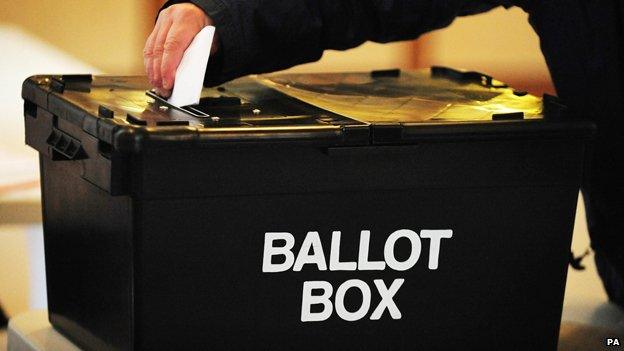

Another factor is the increasing number of three-way marginals in this election, which makes it more difficult to vote tactically as it's harder to predict which party is in which podium position in each constituency.
He also thinks VoteSwap is one-sided. "I can see how Labour can profit, but not the Greens. Where is the constituency where voting Green will keep the Tories out? Their principal opponents in Brighton Pavillion are Labour while in Bristol West and Norwich South they are trying to take a seat from the Liberal Democrats," he says.
But Dr Fisher thinks it's not just about winning seats. If plenty of people lend their vote to the Green Party in safe Labour seats or safe Tory seats then the Greens could end up with a noticeable share of the vote, which will be important for building future campaigns, he suggests.
He thinks there is plenty of room for a "tactical squeeze" in this election, speculating that the tightly-fought battle could see as many as 100 seats swung by tactical voting.
"We've never seen anything like that. Then again, it depends on so many factors. What party is second and third and fourth place locally? Do people care who wins? Are they in a position to tactical vote? What do they know about their constituency as there are muddy waters? Will there be strategic coalition voting?
"This isn't a normal three party race. People could desert the party that is likely to win."
Subscribe to the BBC News Magazine's email newsletter to get articles sent to your inbox.